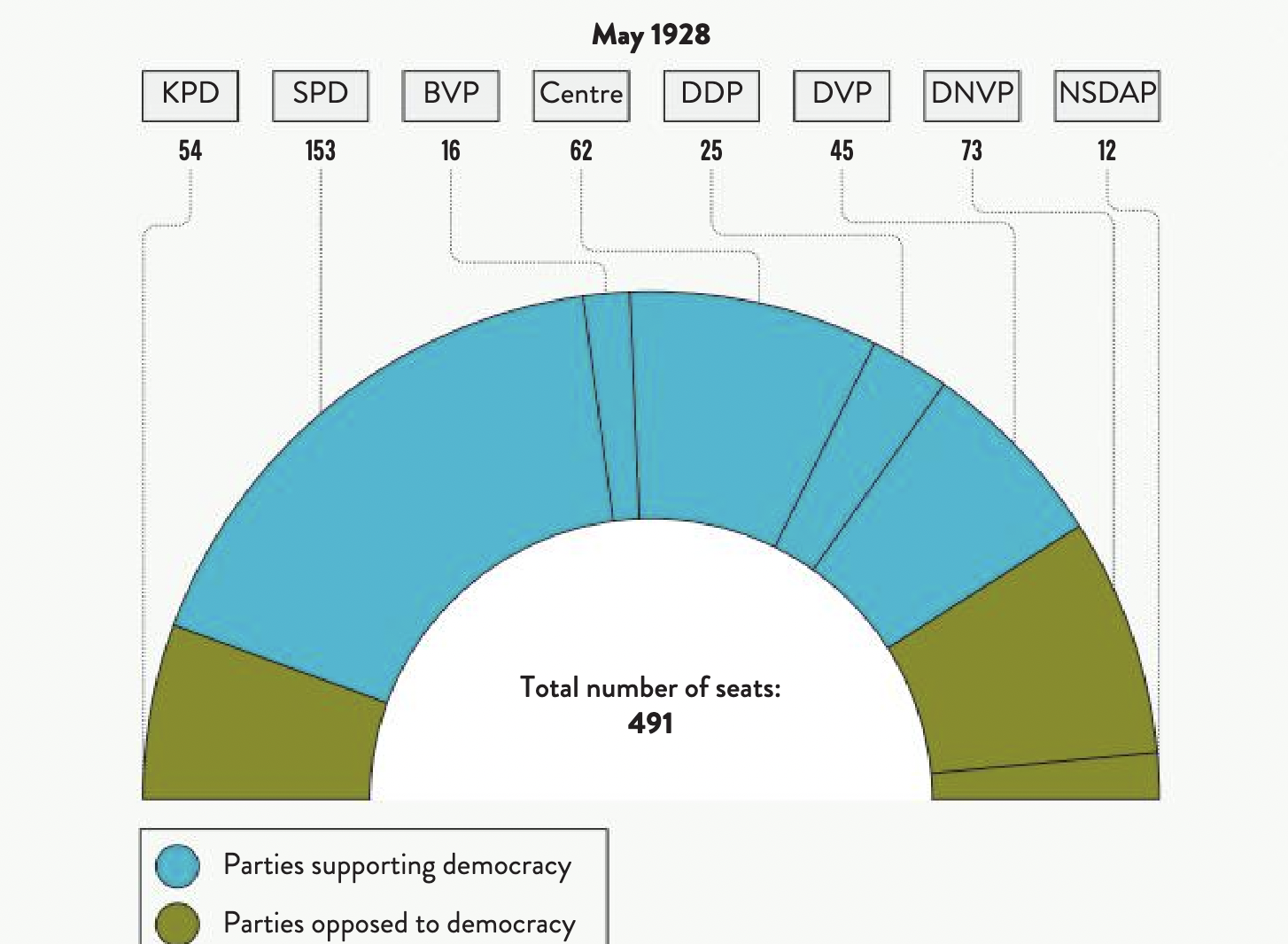the rise of the nazi party
1/18
Earn XP
Description and Tags
late 20s - early 30s
Name | Mastery | Learn | Test | Matching | Spaced | Call with Kai |
|---|
No analytics yet
Send a link to your students to track their progress
19 Terms
1928 election
only won 12 seats
still operating on fringe of G politics
had national stability continued, NP would not have attained more votes in future

changes between 1928 and 1930
NP made alliance w G National People’s Party (DNVP) in July 1929
leader of DNVP very wealthy, controlled newspapers + news outlets which were used by NP to promote the party
the great depression
US banks recalled loans from G —> economic collapse
led to political instability, social hardships, widespread unemployment (6M @ end of 1932)
govt. became divided
SPD wanted to increase taxes to pay relief payments
opposed by other parties
govt. fell 27/11/30
post fallen govt.
Hindenburg wasn’t prepared to make decision
sought advice of Chief of Army General von Schleicher
GvS suggested appointment of Heinrich Brüning as Chancellor as he favoured army
Brüning did not have majority in Reichstag —> got Hindenburg to use a48
chancellor brüning
wanted policy of deflation which was to be achieved by:
cutting govt. expenditure
decreasing taxes
Reichstag rejected budget in July
Hindenburg had to use a48 to implement budget
Reichstag voted Brüning out of govt. w vote of no conf.
Brüning responded by asking Hind to dissolve prlt. + call for new election
1930 election
NP saw as an opportunity to gain more seats
portrayed themselves as a party of action
attacked:
weaknesses of current parliamentary system
divided PPs
inaction of current govt. regarding GD
used G feelings of resentment + frustration
did not say HOW they would have national revival but projected determination + confidence
1930 election outcome
SPD still largest party (143), willing to support Brüning
Nazis 2nd largest party (107)
communists 3rd (77)
both left + right opposed democracy + blocked any meaningful action made by SPD
Brüning relied on a48 to introduce unpopular tax ^ and welfare cuts
Hindenburgs term ended in 1932 + Brüning tried to extend his term but prlt. declined
the NP in the April 1932 election
Hindenburg reluctantly agreed to run again along w Hitler
biggest NP campaign yet
H went to an average of 21 cities/week, 6/day
mass rallies
all organised by Goebels
Hind didn’t campaign due to health + dignity
Hind achieved 53% of vote —> president again @ 83
influence of the army
never fully supported WR, often acted independently
during GD many believed G needed authoritarian govt.
Chief of G Army, General von Schleicher became key figure
influence of Schleicher
advised Hind + showed interest in NP + views
began trying to remove Brüning as Chancellor as he failed to fix economic problems
Hind was convinced to ask for Brüning’s resignation which showed:
failure for democracy
power didn’t reside w parliament but w Hind + inner circle
franz von papen general
wealthy + conservative
supported by few except for Hind’s inner-circle
“hat without a head”
franz von papen as chancellor
had 10 man cabinet known as “Cabinet of Barons”
made up of RW nobility selected + approved by Schleicher
no support in Reichstag
left wing + other PPs furious at how democracy had been betrayed
to help support Papen, Schleicher secured understanding that H + NP would cooperate if ban over SA + SS was lifted + new election was called
Papen agreed —> new election called in July
july 1932 election
NP’s most vigorous campaign yet
street clashes between NP + communists
17/7/32 NP planned a provocative march through communist neighbourhood in Hamburg —> 19 deaths + 200 injuries
H addressed rising unemployment (@5.4M) + hardships of GD
NP won 37.4% of vote + 230 seats —> largest PP in Reichstag
overwhelming rejection of Papen + CoB, only won 44 seats
post july ‘32 elections
H demanded Chancellorship as largest PP
Hind refused as he had a personal dislike for H
was offered position of vice-chancellor but rejected
Papen was outvoted in VoNC Reichstag’s first sitting
Reichstag dissolved (w a48) and 4th election was called in the span of 8 months
november ‘32 elections
NP reluctant for another election as funds depleting and difficult to maintain momentum
NP vote declined to 32%, seats to 196 (still the largest)
communists increased from 89 to 100
papen’s resignation
Papen still had no support but in power due to a48
H asked for Chancellorship but refused by H as thought would form dictatorship
Schleicher decided Papen had failed
unemployment @6M
failing economy
increase in communism
dislike of P/Hin friendship
feared civil war would break out if another election
GvS convinced Hind to make P resign
Hind appointed Schleicher as Chancellor
schleicher as chancellor
businesses + industrialists who supported Hind + Papel had intense distrust for Schleicher
GvS attempted to split NP by offering high profile Nazi, Gregor Strasser, vice-chancellor
H found out and had all Nazis swear an oath to him personally
Strasser was accused of treason to the party + resigned
Schleicher + Strasser shot by SS 18 months later
papen/NP coalition
P remained in Berlin trying to get rid of GvS
4/1/33 P had meeting w Hind’s son + closest advisor
planned to form coailtion w NP
businesses + industrialists supported and pressured Hind to accept deal which would incl.
H as chancellor + P as vice
P to be present at all meetings w H/Hind
only 3/11 members of cabinet to be Nazis
hitler as chancellor
Hind was assured that while H was chancellor, power still lay w him + P but still doubtful
“I already have one foot in the grave and I am not sure that I will regret this action later on in heaven”